These days no one bats an eye at the idea of flyfishing for muskies but there was a time—not so very long ago, really—when it was regarded with deep skepticism. If you have any familiarity with “conventional” muskie tackle it’s easy to figure out why. You could winch jackknifed semis out of ditches with the reels, buttress mineshafts with the rods, moor aircraft carriers with the lines and leaders. This is to say nothing of the baits: plugs the size of fungo bats, spinners with more metal than a lot of the cars they’re making these days, live suckers of a size that could feed a family of four for a week.
Translate this into flyfishing terms and it’s not a pretty picture. And it only gets uglier when you consider that this isn’t a sight-fishing exercise like, say, tarpon fishing, but a matter of constant, unrelenting, non-stop blind casting. The muskie, after all, is known as “The Fish of 10,000 Casts.” Imagine 10,000 double-hauls with a 10-weight rod and a fly that would show up on radar if it gained enough altitude, and you’re well on your way to understanding why the endeavor does not leap to mind as one of life’s great pleasures. You could build a pyramid with less effort.
Still, the fact that I was doing it then, at least after a fashion, may be the single instance in my entire life in which I can honestly say I was ahead of the curve, or on the cutting edge, or something like that. I’d become acquainted with a certain Wisconsin muskie guide—let’s call him K—who was adamant that streamers of the basic Deceiver type would catch muskies, especially in the early part of the season when they’re feeding on smaller prey.
In retrospect it’s obvious that this was a vanity project for K, something he simply wanted to prove could be done, and in me—a wannabe desperate to develop some flyfishing cred—he found a willing collaborator.
A dupe, in other words.
Anyway, we scheduled a couple days of fishing, and in the late-afternoon of the second day, my casting hand reduced to a pulp of raw, weeping blisters, it happened. I was pounding a weedy flat on the fourth lake we’d fished when the fly, a #1/0 green-and-white Deceiver, just sort of stopped. I reared back, and after a desultory struggle found myself in the elite company of anglers who’ve landed a muskie on a flyrod.
The fish was no trophy—we’re talking barely legal here, maybe 35 inches—but it was a muskie. And as the bumper stickers in muskie country say, “All other fish are just bait.”
I should have quit while I was ahead. But of course no one does that, ever, so for close to a decade I made at least one and sometimes two trips to northern Wisconsin to fecklessly flog the water. K, for his part, assured me every year that he had the deal “wired,” that he’d found a “killer” new fly or a “can’t miss” spot or a presentation wrinkle that made “all the difference.”
But he was—and I’m being generous here—farting through silk. I never caught another muskie on a fly with K. (I should note here that we fished lakes exclusively; this was before it became common knowledge that your chances of hooking a muskie on a fly are exponentially better in moving water.) Some of my trips with K were so utterly devoid of eventfulness, in fact, that I have no specific memory of them. None. All I retain is a sense of the mind-numbing repetition: casting, stripping, casting, stripping, casting, stripping.
And people wonder why postal workers go bonkers.
The most interesting thing that happened during that Dark Age was the time K, my fishing buddy Peter Corbin, and I were having lunch—lunch!—at a resort on Lac Vieux Desert, a sprawling body of water on the Wisconsin-Michigan border. The place was one of those nostalgic northwoods lodges direct from central casting, with lots of mounted muskies and deer heads and plenty of that woodsy Paul Bunyan-meets-the Hamm’s bear ambience. They served a tasty cheeseburger, too.
Having decided that we needed a better imitation of the crappies that the muskies were supposedly feeding on (that’s what K claimed, anyway), Corbin brought his portable tying kit into the lodge and, producing tools, thread, hooks, and assorted materials, went at it. This caught the eye of the resort’s proprietor, who was pouring beers for a gang of walleye fishermen. He strolled over to our table for a look, then disappeared behind the bar. When he came back he was carrying an armload of antique-looking wooden boxes—boxes which he opened to reveal hundreds, hundreds, of classic feather-wing Atlantic salmon flies. Many were so old that the hooks were eyed with looped gut. Our jaws hit the floor; we couldn’t have been more surprised if the guy had shown us a collection of shrunken heads.
Corbin, who’s steeped in the tweedy lore of Atlantic salmon fishing, was the first to regain his powers of speech. “My God!” he cried, examining a fully dressed Black Dose. “These flies belong in a museum!”
“You mean they’re rare or something?” the lodge owner asked. “They belonged to a doctor who had a place across the lake, and when he died they auctioned off a lot of his stuff. I thought these flies were kind of neat, so I gave $25 for them.”
At that point our jaws went slack again. This what-are-the-odds interlude would have been a welcome bonus to any fishing excursion, but against the featureless canvas of a muskie trip it stood out like Kate Upton sunning on a deserted beach.
And yes, Corbin eventually whipped up a couple of new flies. They worked no better than the old ones. But then, they worked no worse, either.
I don’t recall it as a sudden epiphany, a moment when a shining light pierced the fog, but at some point it occurred to me that there are a lot more enjoyable ways not to catch fish. When K called to schedule our annual flogfest, I told him that I’d volunteered to have a class of first-year urology students practice digital prostate exams on me for extra credit and wouldn’t be able to come. Hanging up the phone, I felt as if I’d been cured of a chronic disease that I was resigned to spending the rest of my life with.
That was the last time I ever spoke to K. I probably could have handled it better.







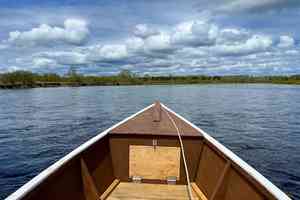







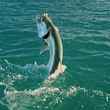
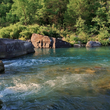









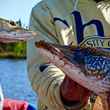
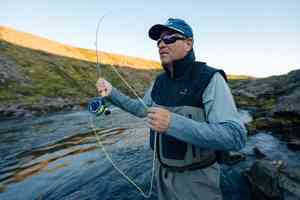



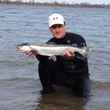
Comments
BP replied on Permalink
Oh, ye of little insider information!! For what you pay K, I’ll let you have a couple of my Esoxinators. And you are absolutely right about fishing the wrong water. ;-)
Pages